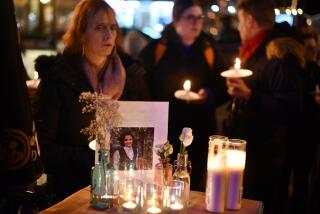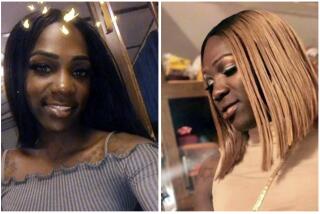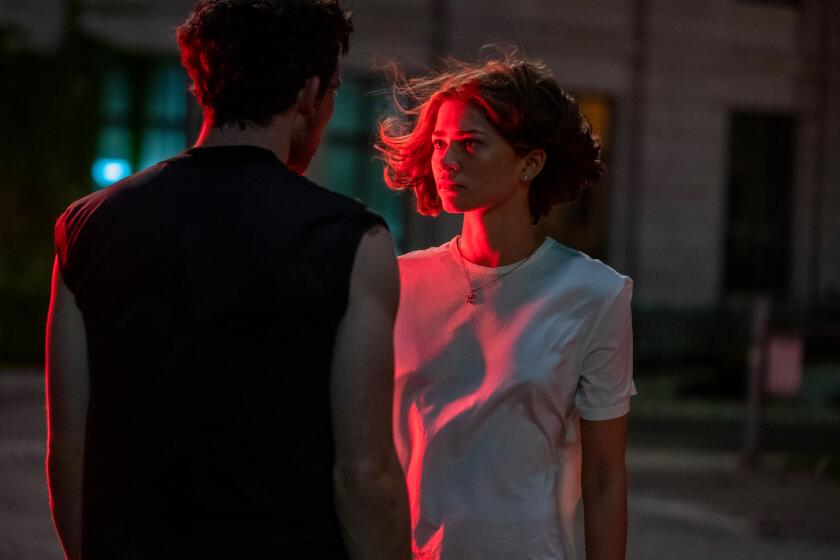LAFF: Why Laverne Cox is lending her voice to the ‘Free Cece’ documentary
CeCe McDonald and a group of friends just wanted to make a midnight run to the store down the street from her Minneapolis home. But in the middle of their walk, they were accosted by a posse of white bar patrons. The antagonizers, male and female, lobbed a number of racist, homophobic and transphobic slurs at the passersby before physically attacking the group. McDonald eventually squared off with one of the male assailants who, by the end of the altercation, died from injuries after a pair of scissors pierced his chest -- scissors that came out of McDonald’s purse.
This was the night of June 5, 2011. A night that landed McDonald, a black transgender woman, in a men’s prison. (Originally charged with two counts of second-degree murder, McDonald pleaded guilty to second-degree manslaughter and was sentenced to 41 months.) A night that set off a firestorm of support with champions who included “Orange Is the New Black” actress Laverne Cox. A night that would prompt McDonald, 28, to seize the title of transgender activist and prison abolitionist. A night where “Free Cece,” a documentary about McDonald’s case and the violence that transgender women of color face that premiered Thursday at the Los Angeles Film Festival, begins.
“I really want people to understand how necessary it is to challenge their privileges, decolonize their minds around the ways we’ve been conditioned to only accept certain kinds of people in our society,” McDonald said about telling her story. “I want people to challenge their ideas of gender identity and sexual orientation, challenge the status quo. Give other people a chance to live.”
“Free Cece” began as the brainchild of director Jac Gares. While the supervising producer of “In the Life,” a public television LGBT news show -- think a gay “60 Minutes” or “Frontline,” Gares said -- she wanted to collaborate with Cox, who was interested in producing a segment about violence against trans women of color, with McDonald’s story at the center. When the show lost its funding in 2011, the idea disappeared. But after an impassioned speech at the 2013 GLAAD Media Awards by Cox, in which she continued to bring awareness to McDonald’s incarceration, Gares partnered with the actress to direct and produce a full-length documentary.
“The thing that stood out the most to me was that CeCe was a survivor, and the way she survived was that she said to herself, ‘My life has value,’” Gares said. “[For black trans women], that’s not a story we often hear in the headlines.”
Most accounts of trans people harassed on the street end in their death. Like Deshawnda “Ta-Ta” Sanchez, who in 2014, at 21 years old, was killed in South L.A. after being attacked, robbed and shot. Or Islan Nettles, who died at 21 years old in 2013 after a group of New York men battered her beyond recognition. Or Amanda Milan, who died at 25 years old from a knife attack to the neck by two New York men in 2000.
As transgender activist Cherno Biko says in the film, McDonald is “the girl who survived.”
According to the Human Rights Campaign and Trans People of Color Coalition, there were 53 transgender victims of violence from 2013 to 2015. Of that number, 46 were trans people of color and 39 were black. But there is a good chance that even more trans people have been killed as misgendering by police ensures definite numbers remain elusive.
McDonald’s story resonates with Cox because she too has been physically attacked. In 2008, while living in New York, she was harassed on the street, misgendered, called names and kicked. Unfortunately, “that is a reality that we as trans women of color live with everyday,” she said.
“I might not be here if one day some decided to take it too far or I felt the need to defend myself and ended up in prison,” she said. “But for the grace of God, I haven’t had to fight for my life in the same way CeCe had to that day.”
“Free CeCe,” which follows McDonald for three years and was partially crowdfunded (nearly $95,000 came from two Indiegogo campaigns), connects her story to the intersectional, systematic and oppressive issues all trans women face, particularly those of color, just being their authentic selves. The documentary includes an interview between Cox and McDonald in jail, McDonald’s release after serving 19 months as well as her visits countrywide thanking supporters and advocating on behalf of trans people. Audiences also get a peek into McDonald’s awakening into activism as she shares how reading Michelle Alexander’s “The New Jim Crow” and Angela Davis’ “Are Prisons Obsolete?” while incarcerated affected her. (Davis is also in the film.)
The film comes at a time when trans visibility is at a historic high with shows such as “Transparent” and “Orange Is the New Black,” and headline-grabbers such as Caitlyn Jenner and Cox herself. Still, as McDonald said: “People are constantly snatching our humanity away as trans women, like our lives don’t matter.” At least 11 trans women of color have been killed so far this year and states across the country are passing anti-trans bathroom bills.
“It’s frustrating to the point where I can’t even cry anymore,” McDonald said.
Cox hopes that the documentary will help bring about a much-needed change in people’s attitudes toward transgender and gender nonconforming people.
“We need to have a culture that doesn’t stigmatize, criminalize and try to erase us through various forms of violence, by the state and by individuals -- but one that embraces and loves us,” she said.
As for McDonald, she understands “it’s not about just seeing us. It’s about people understanding our plight,” she said. “We are regular people. We need to thrive.”
Twitter: @TrevellAnderson
More to Read
Only good movies
Get the Indie Focus newsletter, Mark Olsen's weekly guide to the world of cinema.
You may occasionally receive promotional content from the Los Angeles Times.






